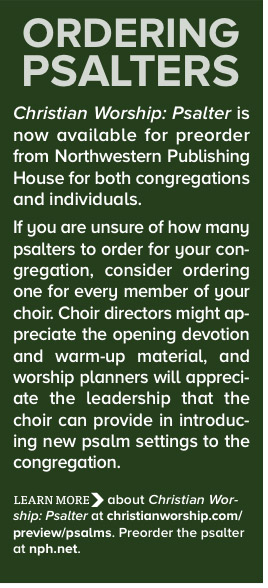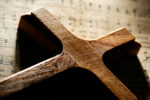 |
Called the hymnal of the Old Testament, the psalms continue to give God’s people comfort, strength, and hope.
It could have been my deathbed.
Personal use of the psalms
It was the second night after my open-heart double bypass surgery. My lungs were not reinflating properly. I was getting a lot of attention in the ICU.
Before my surgery, my pastor and my family prayed and read Scripture with me. I had the Lord’s Supper. My father had told me, “If you get nervous, just sing through ‘Jesus, Priceless Treasure.’ That’s my favorite hymn.”
But there on what could have been my deathbed, I found out that I did not have the strength or focus to sing through all of “Jesus, Priceless Treasure.” Instead, what went through my mind over and over were short psalm verses set to music.
“God is the strength of my heart, and my portion forever.”
“I will live in the house of the LORD, all the days, all the days of my life.”
“I will not die but live, and will proclaim what the LORD has done.”
My heart surgery came right in the middle of working on the Psalms project for the new WELS hymnal, so it shouldn’t have been a surprise that those verses were on my mind.
My Psalmody Committee had looked at over 10,000 musical settings of all 150 psalms. They had narrowed it down to about 5,000 of those settings to review, and they were in the process of choosing the best 500.
No matter where people are in life, the psalms make perfect devotions for them.
Sometimes what made a setting the best was that the refrain was memorable. The music just captured the mood of the words, and the notes stuck with a person. Other times what made a setting the best was that the refrain was the center verse of the psalm. Many psalms were written as a kind of poetry that puts the key thought in the very middle of the psalm. It impressed the committee whenever a composer could take that key thought and make it into a musical refrain that was easy to sing.
As I lay there in the ICU, I could see how valuable that was. It was helpful and comforting that the promises of God were clearly on my mind when not much else could be. The music helped. Just after major surgery, I was happy to have key verses of the Bible on my mind.
It turned out not to be my deathbed. But the whole experience got me thinking about the ways that believers have appreciated the psalms through the years.
Expanded use of the psalms
At first psalms were used in worship in the temple in Jerusalem. People have called them the hymnal of the Old Testament. They were clearly accompanied by music, although we don’t know precisely what that music sounded like.
As time went on, believers began to read and pray and sing psalms at home in their families. The psalms are written in such a versatile way that individuals and families can use them in home devotions regardless of how much musical ability there is in any given home.
One of the strengths of Christian Worship (1993) is that selected psalms were set to music so that congregations could use them in worship. The Psalmody Committee for the new hymnal decided to expand the musical styles available so that even more congregations could use selected psalms in worship.
The Psalmody Committee for the new hymnal proposed publishing a book of all the psalms, not just selected ones, with prayers, commentary, and a variety of musical settings for use in home devotions. The main committee for the new hymnal agreed, and the idea of Christian Worship: Psalter was born.
Every psalm is in the psalter. It’s printed so that the words can be read or sung, all together or with alternate readers and singers. Every psalm has a prayer that reflects the ways believers have used that psalm in their faith life through the ages. Every psalm has a brief commentary by Martin Luther, newly translated from the original German.
 Martin Luther knew the psalms well. He had been a monk before he was a reformer, and at his monastery they had the custom of singing through every word of all 150 psalms every week. Early Lutheran church musicians had that kind of familiarity with the psalms too, and the Psalmody Committee for the new hymnal picked out a few of their settings to be included in the new psalter.
Martin Luther knew the psalms well. He had been a monk before he was a reformer, and at his monastery they had the custom of singing through every word of all 150 psalms every week. Early Lutheran church musicians had that kind of familiarity with the psalms too, and the Psalmody Committee for the new hymnal picked out a few of their settings to be included in the new psalter.
Every psalm in the psalter has at least one setting that sings just like a hymn. About 50 of them are already familiar from Christian Worship (1993) and Christian Worship: Supplement, and about 20 of them are revived from The Lutheran Hymnal. The rest are hymns from other hymnals that the Psalmody Committee is pleased to introduce to churches who use the new hymnal.
Every psalm in the psalter also has at least one setting that sings just like the psalms in Christian Worship (1993). About half of them are precisely in the same style, including the most singable settings from that book, and the other half have refrains and tones that might seem lyrical to the American ear.
Many of the psalms in the psalter have special settings in world music styles like African, Asian, Caribbean, Latin American, and Israeli. We are hoping that singing psalms in those styles might inspire composers of our fellowship to produce even more.
Lutheran schools have used psalms for devotions and chapel for hundreds of years, and the settings in the new psalter will help and encourage that use. Some of the settings are chosen precisely because they work well for younger children to learn and sing.
All of the new psalter resources will be available with the electronic resources for the new hymnal. If a congregation or a school likes a particular musical style for the psalms sung in worship, they will be able to click and choose any of the 500 settings in the psalter for any service.
Individuals who are looking for particular themes in the psalms will benefit from the Usage Index at the back of the psalter. It should be helpful to people preparing devotions for others and for themselves.
A person could be starting an exciting new stage in life or lying on a deathbed, enduring a pandemic or celebrating healing. No matter where people are in life, the psalms make perfect devotions for them.
Martin Luther said, “No devotional book has ever appeared that is superior to the Psalms. They clearly and prophetically detail the death and resurrection of Christ. The Psalms, inspired by the Holy Spirit, are the songs of his people, his Church, with hearts laid open, praising and lamenting. They are our words of devotion.”
Author: Paul Prange
Volume 108, Number 4
Issue: April 2021







